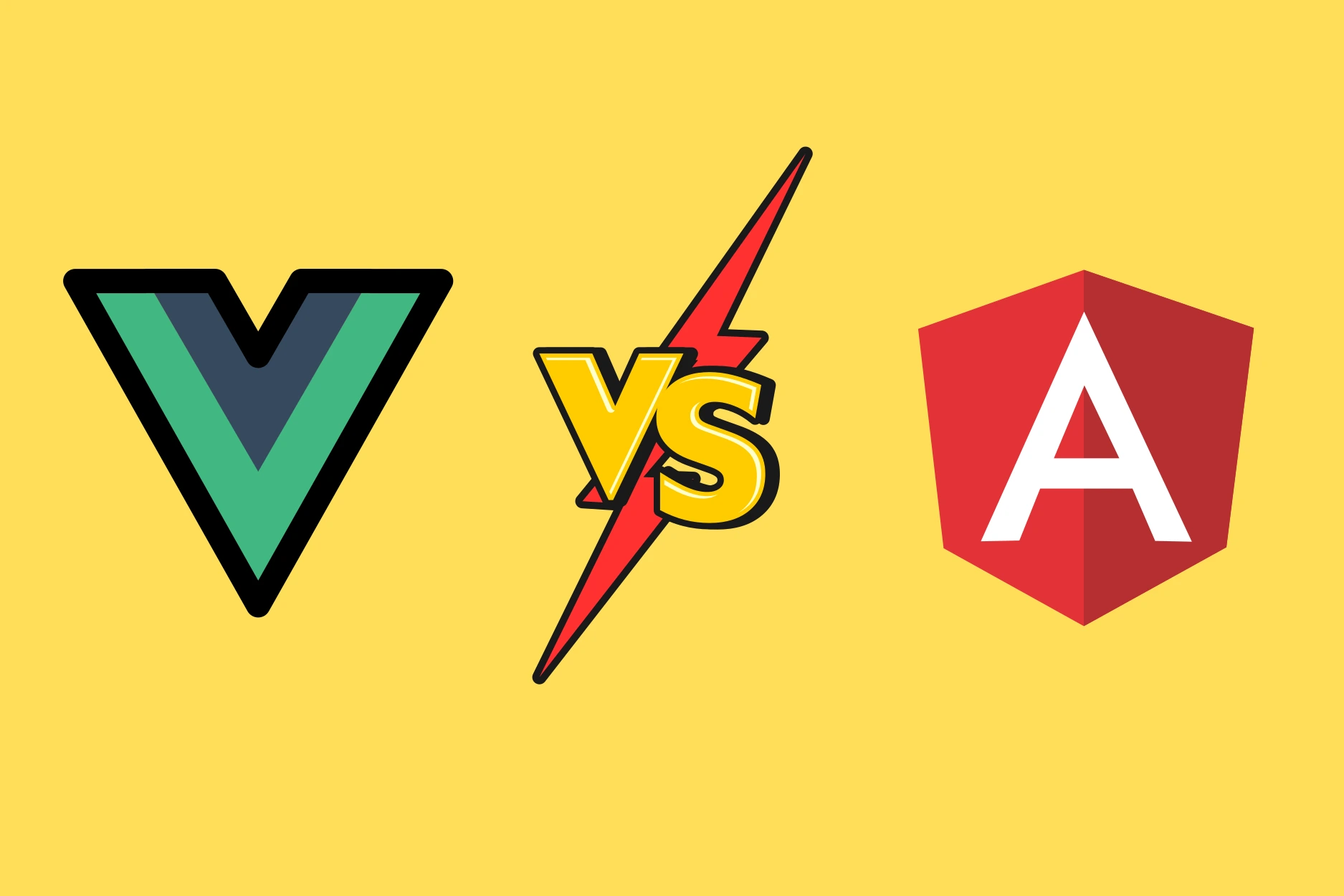Vue vs. Angular: Which Framework Is the Better Choice?
As a result of the recent Stack Overflow survey, Vue.js and Angular are two of the most popular frameworks. 16.38% of developers use Vue.js, and 17.46% of developers use Angular. Close competition makes the strength of both frameworks look similar, but which one is the better choice for your project? Each has its features, strengths, and weaknesses. Compare and contrast Vue with Angular: find out which of the frameworks should be used in your next project.
What is Vue.js?
Vue.js is an incrementally adoptable JavaScript framework that focuses on the view layer. It was created by Evan You in 2014 and allows the developer to adopt its features incrementally. This means incorporating it into projects and not necessarily writing it anew—this makes it the best alternative for improving an existing application.
Vue.js is well-known for its incremental adoption approach, which makes it easy to add it to an existing project or start large-scale applications from scratch. The core library focuses mainly on the view layer. However, it also includes additional libraries such as Vue Router for routing and Vuex for state management.
What is Angular?
Angular is a platform and architecture for building SPAs. It is built in TypeScript, and Google created this framework. Angular provides an end-to-end solution for developing complex web applications, and it offers a wide array of features, such as dependency injection, template syntax, and a very robust CLI for project scaffolding and management.
[Also Read - Flutter vs. Angular vs. React: Find Your Ideal App Development Framework ]
Vue vs. Angular Features
Important Features of Vue.js
Reactive Data Binding: Vue's reactive data binding ensures that everything that changes in the model is automatically updated in the view, hence making state management much simpler.
Component-Based Architecture: Vue considers the philosophy of building an application using reusable components, which helps maintain a clear structure and encourages code reuse.
Virtual DOM: Similar to React, it uses a virtual DOM to render optimally, so the updates are very fast.
Simplicity and Easy Understanding: Vue's syntax is natural and easy to understand, so it can get any developer running, whether he is junior or more experienced. Vast Ecosystem: Vue has a wide variety of libraries, from Vue Router to support routing and Vuex to govern state management.
Important Features of Angular
TypeScript Support: Angular has been natively built on top of TypeScript, a superset of the JavaScript language equipped with static type checking. This would help you attain better quality and maintainability of your code.
Component-Based Architecture: Angular employs components, just like Vue, but it also has a strong dependency injection mechanism to effectively handle components and services.
Two-Way Data Binding: This feature of Angular simplifies managing the state across components by enabling synchronization between the model and the display.
Strong CLI: Angular's Command Line Interface (CLI) greatly accelerates the development process, simplifying project setup, testing, and deployment.
Rich Ecosystem and Official Libraries: Angular provides a robust collection of official libraries for forms, routing, and HTTP client management to ensure developers have the resources they require.
Rich Ecosystem and Official Libraries: Angular offers a rich set of official libraries for routing, forms, and HTTP client management, which means developers have the tools they need at their disposal.
[Also Read - NestJS vs ExpressJS: How to Choose the Right Framework? ]
Vue vs. Angular: Side-by-Side Comparison
| Feature | Vue.js | Angular |
|---|---|---|
| Learning Curve | Gentle, easy to pick up | Steep, requires understanding of TypeScript and Angular concepts |
| Popularity | Growing rapidly, strong community | Well-established, large community and enterprise adoption |
| Syntax and Complexity | Simple, concise syntax | More complex, verbose syntax |
| Size and Performance | Lightweight, fast | Heavier, can be slower in certain scenarios |
| Data Rendering | Virtual DOM for efficient updates | Change detection mechanism |
| TypeScript Integration | Strong integration | Built on TypeScript |
| Architecture | MVVM | MVC |
| Flexibility and Structure | Flexible, customizable structure | A more structured, opinionated approach |
| Use Cases | Small to medium-sized projects, progressive web apps | Large-scale enterprise applications, complex web apps |
Here is a good and thorough comparison of Vue.js and Angular side-by-side. Observe how the two frameworks compare and contrast.
1. Learning Curve
It is simpler to learn Vue, particularly if you are switching from React to Angular. The templates of Vue.js are written in HTML, and the framework is based entirely on JavaScript. As a result, Vue engineers and developers may master any programming language than JavaScript.
You can begin using Vue in a day if you understand JavaScript well enough, according to their manual.
It's very complex and has an extremely steep learning curve. In order to use Angular, you need to be aware of TypeScript and the way the MVC (Model View Controller) works. Due to this, it becomes difficult for a beginner to learn in just a few years of practice.
The niche group, which includes experienced users and developers, understands it fully. And usage among those is the number of years of experience behind.
2. Popularity
Angular has a huge community support that has been growing since its initial release. From an employment perspective, Angular has a wider market. Most large companies prefer to use Angular since it is relatively easy to develop and handle large, complex web applications. Indeed, as a company delivering Angular web development services, we use the Angular framework to develop enterprise-level web solutions.
With such popularity comes a whole spectrum of solutions for various users. You can also get the help of developers who have much experience beyond yours without any long process of getting assistance from tech support people.
Vue is a growing community. While it became popular very fast, its market still needs to grow compared to React or Angular.
Vue will need at least a few years to create jobs. Although it mainly works in the open-source community, it is still at a lower knowledge-sharing level than Angular.
3. Syntax and Complexity
Vue is very easy to use and learn. The syntax is quite simple, and your code in a Vue application will be neat, short, and clean.
As mentioned above, Angular is much more complex to use than Vue. Due to rigid rules of structure, even a simple action requires long lines of code. An Angular app will also have a much more complex syntax.
4. Size
Vue is known to be small and lightweight compared to Angular. Many needed functionalities and features are integrated here in the form of third-party elements and applications. Further, other third-party libraries need to be added because not many core libraries are incorporated into Vue by default.
The code is shorter and less complicated. Because the latest version of Vue is smaller and operates more quickly than its predecessors, users may utilize the framework easily and move between locations easily.
Angular differs in that it comes with many more pre-installed functionalities and libraries. As a result, Angular becomes a monolithic framework that needs a lot of storage space. Most of these elements will never be used, but others are useful and necessary.
5. Data Rendering
Vue.js utilizes virtual DOMs or the abridged version of DOM. For a default performance-optimized configuration, the framework uses the virtual DOM. Therefore, it doesn't render the user interfaces; instead, the virtual DOM is rendered each time the application's data changes.
Hence, it improves significantly both the application's runtime and load time. Moreover, updating the views becomes relatively easier with the help of the virtual DOM.
Unlike other frameworks, Angular.js does not use Virtual DOMs but uses watchers that make rendering data extremely simple. Old data values are tracked, and only parts of the original DOM get updated whose values have changed.
6. TypeScript
TypeScript is used to write all of the resources and documentation for Angular.js because it is a Javascript framework that uses TypeScript.
It is used to write the framework itself, giving you plenty of chance to manage the code inside a clear structure. This is an extra benefit, particularly for developing large-scale applications.
The new edition of Vue.js has also introduced decorators and official typings. We believe Vue is much better suited to the current state of TypeScript integration. This is mainly because smaller usage might require a huge amount of coding and can also become very cumbersome.
7. MVC/MVVM
Angular is based on the MVC (Model-View-Controller) framework. This implies that, logically, the application is broadly split into three parts: model, view, and controller.
In this way, the software is divided into separate components, the application logic layer and the user interface layer. Developers may use Angular to create well-structured code and break up large code into smaller, more manageable pieces. It is a fantastic tool for creating intricate, multi-page web apps.
The MVVM JavaScript framework concept serves as the foundation for Vue.js. The logic for the application is stored in the model layer, while the logic for the user interface is stored in the view layer. Data is passed between the view and model levels in the View Model layer.
In Vue applications, this creates two-way data binding, which allows data to flow in both directions.
The MVVM approach makes it easier to manage HTML blocks, and it makes it easier for Vue developers to test units. In the MVC framework, however, the building elements function more effectively as a whole.
8. Structure and Flexibility
Vue is quite unstructured, giving the developer many flexibilities. It supports an official build system, in which you can design your application however you wish. How you structure your app is also up to you. You might write your templates using a file that's either HTML or JavaScript.
Angular has a much more defined app architecture, which helps especially when developing large applications. Most large companies prefer Angular over other frameworks because it provides a standard architecture for all developers.
Choose between flexibility and structure according to your type of developer or team.
Use Cases
When to Use Vue.js
- Small to Medium Projects: Vue works amazingly well in small and medium-sized applications where fast development and easy integration are desirable.
- Progressive Enhancement: When you want to improve a previously built application but need to do this incrementally instead of rewriting, Vue facilitates progressive adoption.
- Ease: When your team consists of developers at varying experience levels, Vue's simplicity will facilitate the onboarding of new developers.
When to Use Angular
- Large-Scale Applications: Angular is suitable for large applications where a full solution is needed. Its architecture accommodates very complex projects that include many features.
- Strong Type Safety: Provided that your team is comfortable and feels good with TypeScript while prioritizing strong typing, using TypeScript inside of Angular enhances code robustness and maintainability as well.
- Enterprise Solutions: There is a preference for an Angular environment in enterprise environments on the grounds of robustness and thorough documentation and support that one would get.
[Also Read - Essential Guide to Developing Mobile Apps for Your Business ]
Conclusion
The final decision between Angular and Vue is based on your project's needs, team's experience, and personal preferences. Vue could be a better option if you are searching for a flexible, lightweight framework for small to medium-sized applications. If you want a strong framework with extensive tooling and support for developing large-scale apps read our guide for ideal app development framework for your project.
Frequently Asked Questions

Read more blogs

Time and Cost of Developing an AI like ChatGPT: Key Factors Explored
Explore the factors influencing the time and cost of developing an AI model like ChatGPT. Understand key considerations for successful AI ap

Guide to Successful Real Estate App Development: Features, Technologies, and More
Explore the advantages of developing a real estate app, key features, technologies to employ, and the importance of collaborating with a Rea

Custom vs. Template-Based Website Development: A Comprehensive Cost Comparison Guide
Explore the costs, pros, and cons of custom website development vs. template-based solutions. Make an informed decision for your online pres
